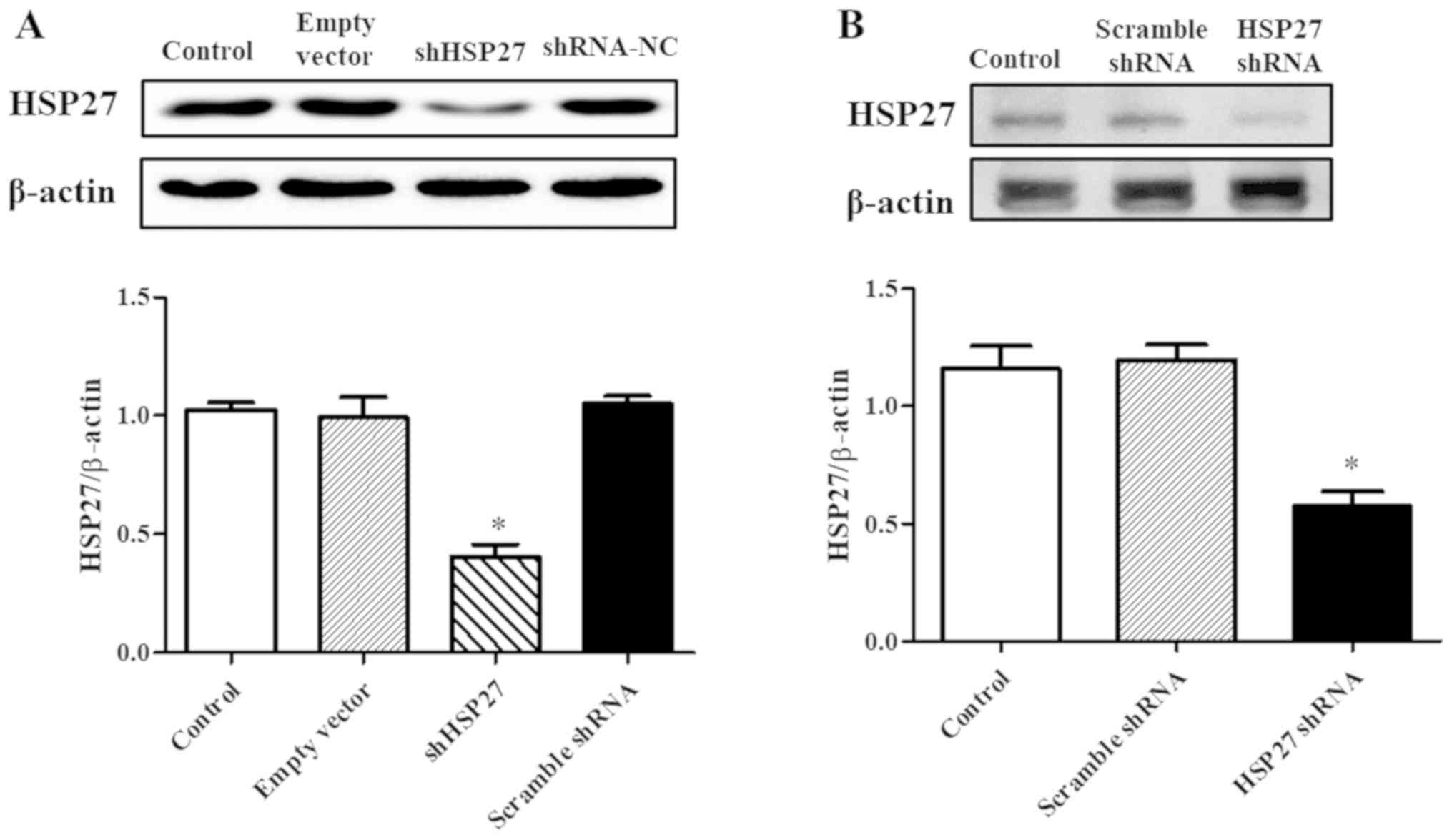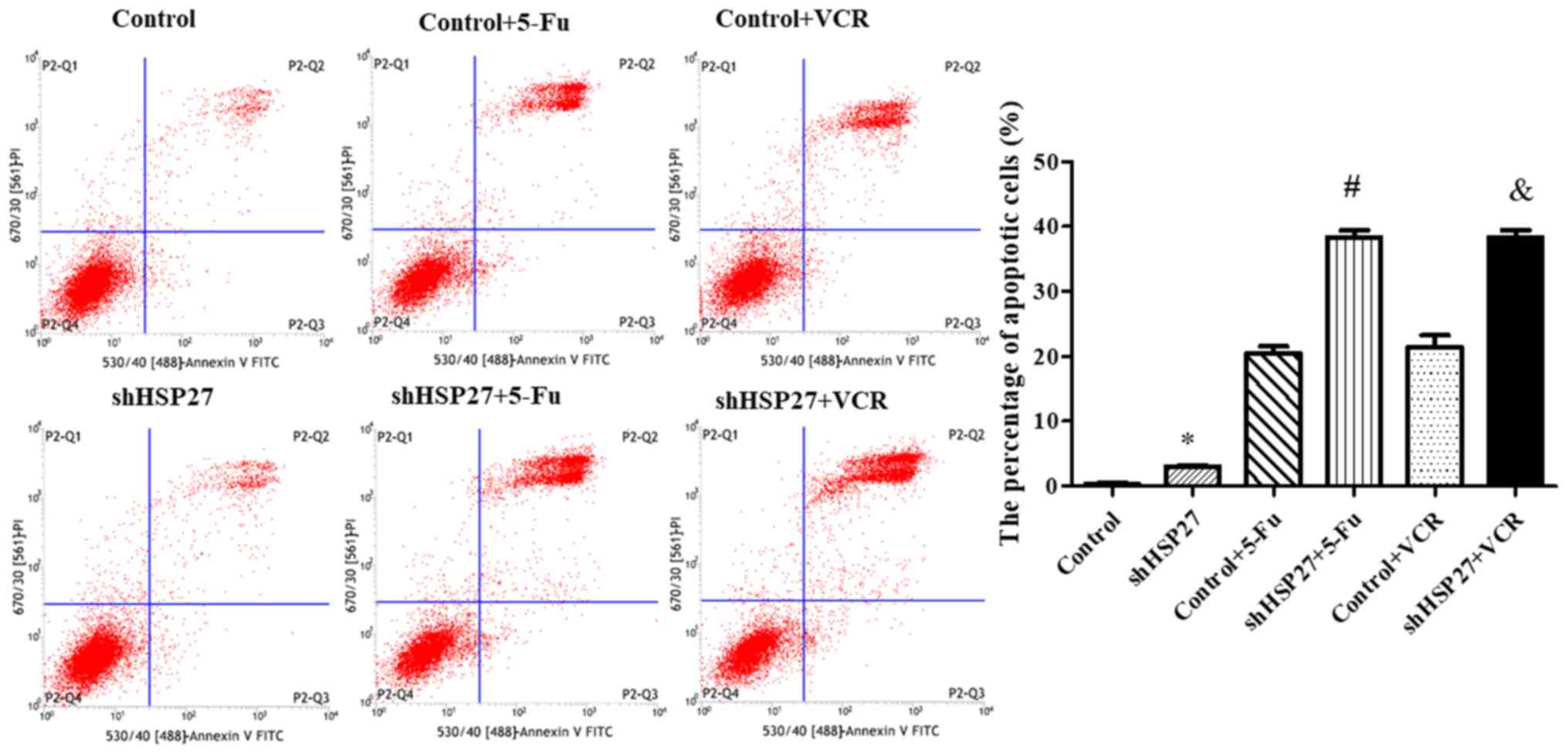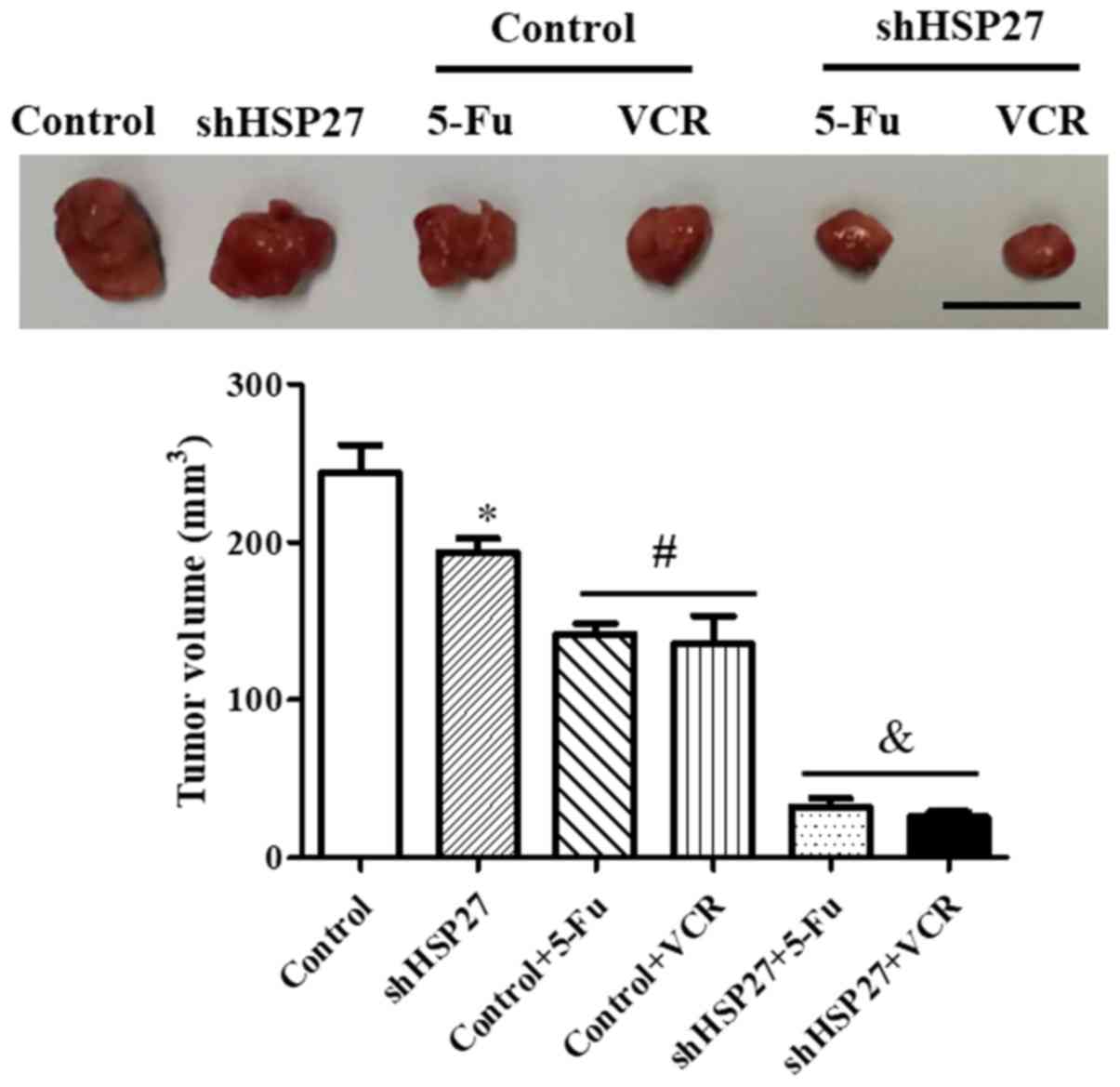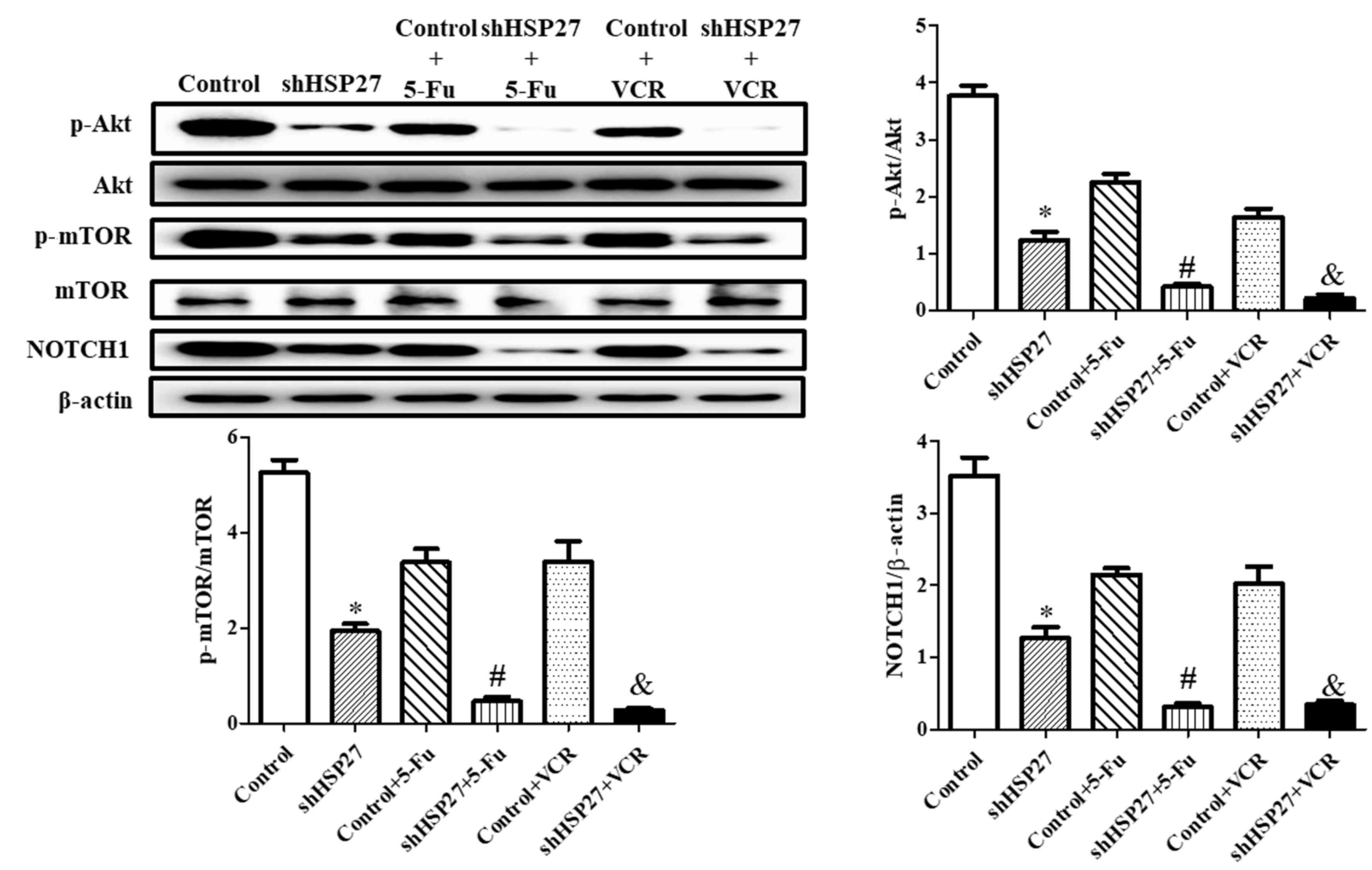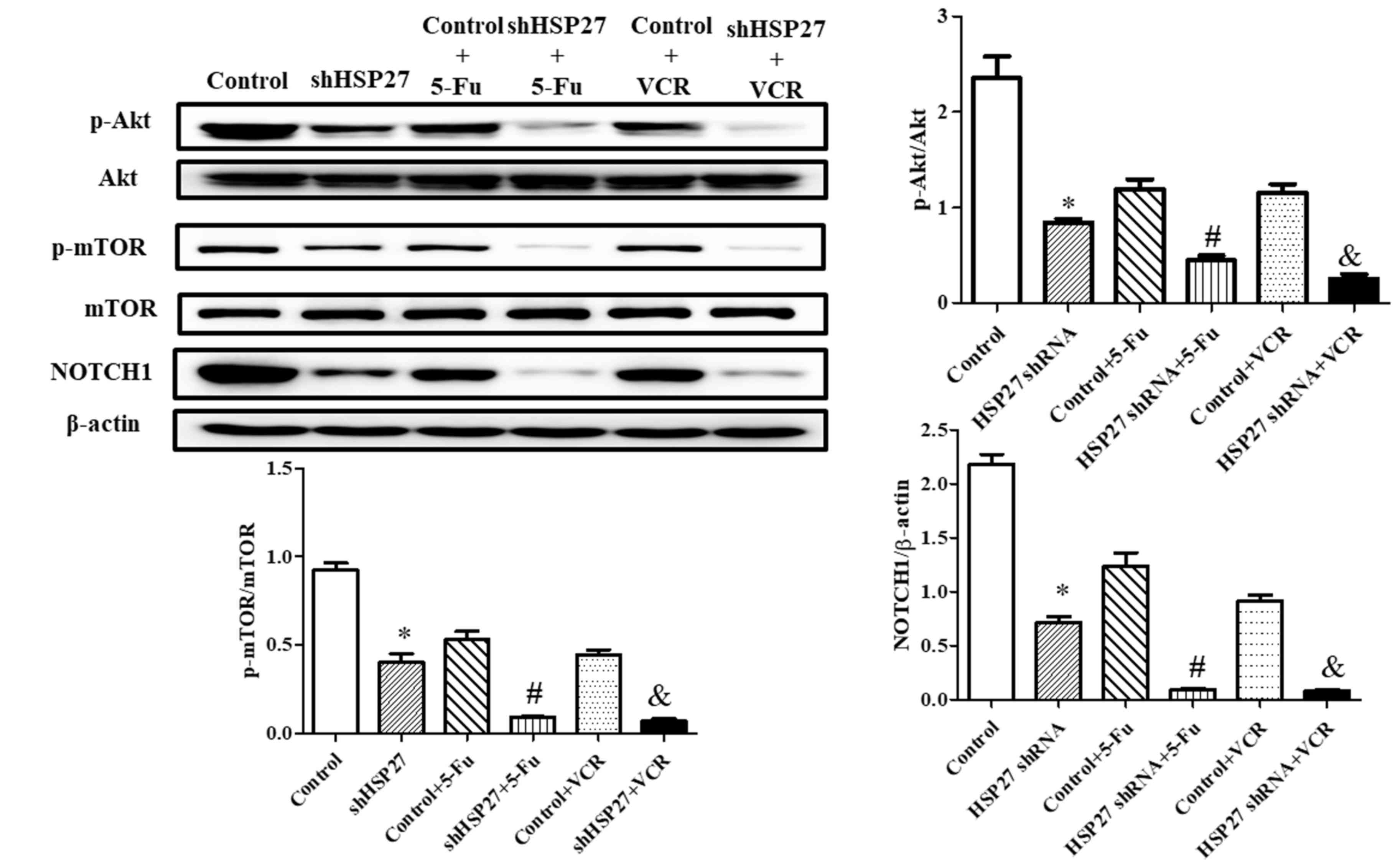|
1
|
Miller KD, Siegel RL, Lin CC, Mariotto AB,
Kramer JL, Rowland JH, Stein KD, Alteri R and Jemal A: Cancer
treatment and survivorship statistics, 2016. CA Cancer J Clin.
66:271–289. 2016. View Article : Google Scholar : PubMed/NCBI
|
|
2
|
Siegel RL, Miller KD, Fedewa SA, Ahnen DJ,
Meester RGS, Barzi A and Jemal A: Colorectal cancer statistics,
2017. CA Cancer J Clin. 67:177–193. 2017. View Article : Google Scholar : PubMed/NCBI
|
|
3
|
Wiseman M: The second World Cancer
Research Fund/American Institute for Cancer Research expert report.
Food, nutrition, physical activity, and the prevention of cancer: A
global perspective. Proc Nutr Soc. 67:253–256. 2008. View Article : Google Scholar : PubMed/NCBI
|
|
4
|
Gill S, Loprinzi CL, Sargent DJ, Thomé SD,
Alberts SR, Haller DG, Benedetti J, Francini G, Shepherd LE,
Francois Seitz J, et al: Pooled analysis of fluorouracil-based
adjuvant therapy for stage II and III colon cancer: Who benefits
and by how much? J Clin Oncol. 22:1797–1806. 2004. View Article : Google Scholar : PubMed/NCBI
|
|
5
|
Meyerhardt JA: Adjuvant therapy for stage
II and III colon cancer. Clin Adv Hematol Oncol. 8:772–774.
2010.PubMed/NCBI
|
|
6
|
Hu T, Li Z, Gao CY and Cho CH: Mechanisms
of drug resistance in colon cancer and its therapeutic strategies.
World J Gastroenterol. 22:6876–6889. 2016. View Article : Google Scholar : PubMed/NCBI
|
|
7
|
Dallas NA, Xia L, Fan F, Gray MJ, Gaur P,
van Buren G II, Samuel S, Kim MP, Lim SJ and Ellis LM:
Chemoresistant colorectal cancer cells, the cancer stem cell
phenotype, and increased sensitivity to insulin-like growth
factor-I receptor inhibition. Cancer Res. 69:1951–1957. 2009.
View Article : Google Scholar : PubMed/NCBI
|
|
8
|
Holohan C, Van Schaeybroeck S, Longley DB
and Johnston PG: Cancer drug resistance: An evolving paradigm. Nat
Rev Cancer. 13:714–726. 2013. View
Article : Google Scholar : PubMed/NCBI
|
|
9
|
Kim EK, Jang M, Song MJ, Kim D, Kim Y and
Jang HH: Redox-mediated mechanism of chemoresistance in cancer
cells. Antioxidants (Basel). 8:E4712019. View Article : Google Scholar : PubMed/NCBI
|
|
10
|
Sharma A: Chemoresistance in cancer cells:
Exosomes as potential regulators of therapeutic tumor
heterogeneity. Nanomedicine (Lond). 12:2137–2148. 2017. View Article : Google Scholar : PubMed/NCBI
|
|
11
|
Chatterjee S and Burns TF: Targeting heat
shock proteins in cancer: A promising therapeutic approach. Int J
Mol Sci. 18:E19782017. View Article : Google Scholar : PubMed/NCBI
|
|
12
|
Wu J, Liu T, Rios Z, Mei Q, Lin X and Cao
S: Heat shock proteins and cancer. Trends Pharmacol Sci.
38:226–256. 2017. View Article : Google Scholar : PubMed/NCBI
|
|
13
|
Garrido C, Brunet M, Didelot C, Zermati Y,
Schmitt E and Kroemer G: Heat shock proteins 27 and 70:
Anti-apoptotic proteins with tumorigenic properties. Cell Cycle.
5:2592–2601. 2006. View Article : Google Scholar : PubMed/NCBI
|
|
14
|
Oesterreich S, Weng CN, Qiu M, Hilsenbeck
SG, Osborne CK and Fuqua SA: The small heat shock protein hsp27 is
correlated with growth and drug resistance in human breast cancer
cell lines. Cancer Res. 53:4443–4448. 1993.PubMed/NCBI
|
|
15
|
Liu CL, Chen SF, Wu MZ, Jao SW, Lin YS,
Yang CY, Lee TY, Wen LW, Lan GL and Nieh S: The molecular and
clinical verification of therapeutic resistance via the p38
MAPK-Hsp27 axis in lung cancer. Oncotarget. 7:14279–14290.
2016.PubMed/NCBI
|
|
16
|
Shimada T, Tsuruta M, Hasegawa H,
Okabayashi K, Shigeta K, Ishida T, Asada Y, Suzumura H, Koishikawa
K, Akimoto S and Kitagawa Y: Heat shock protein 27 knockdown using
nucleotide-based therapies enhances sensitivity to 5-FU
chemotherapy in SW480 human colon cancer cells. Oncol Rep.
39:1119–1124. 2018.PubMed/NCBI
|
|
17
|
Liang HH, Huang CY, Chou CW, Makondi PT,
Huang MT, Wei PL and Chang YJ: Heat shock protein 27 influences the
anti-cancer effect of curcumin in colon cancer cells through ROS
production and autophagy activation. Life Sci. 209:43–51. 2018.
View Article : Google Scholar : PubMed/NCBI
|
|
18
|
Hayashi R, Ishii Y, Ochiai H, Matsunaga A,
Endo T, Hasegawa H and Kitagawa Y: Suppression of heat shock
protein 27 expression promotes 5-fluorouracil sensitivity in colon
cancer cells in a xenograft model. Oncol Rep. 28:1269–1274. 2012.
View Article : Google Scholar : PubMed/NCBI
|
|
19
|
Krawczyk Z, Gogler-Piglowska A, Sojka DR
and Scieglinska D: The role of heat shock proteins in cisplatin
resistance. Anticancer Agents Med Chem. 18:2093–2109. 2018.
View Article : Google Scholar : PubMed/NCBI
|
|
20
|
Ishida T, Ishii Y, Tsuruta M, Okabayashi
K, Akimoto S, Koishikawa K, Hasegawa H and Kitagawa Y: Cetuximab
promotes SN38 sensitivity via suppression of heat shock protein 27
in colorectal cancer cells with wild-type RAS. Oncol Rep.
38:926–932. 2017. View Article : Google Scholar : PubMed/NCBI
|
|
21
|
Zeng C, Xing R, Liu J and Xing F: Role of
CSL-dependent and independent Notch signaling pathways in cell
apoptosis. Apoptosis. 21:1–12. 2016. View Article : Google Scholar : PubMed/NCBI
|
|
22
|
Aithal MG and Rajeswari N: Role of Notch
signalling pathway in cancer and its association with DNA
methylation. J Genet. 92:667–675. 2013. View Article : Google Scholar : PubMed/NCBI
|
|
23
|
Yang Z, Qi Y, Lai N, Zhang J, Chen Z, Liu
M, Zhang W, Luo R and Kang S: Notch1 signaling in melanoma cells
promoted tumor-induced immunosuppression via upregulation of
TGF-β1. J Exp Clin Cancer Res. 37:12018. View Article : Google Scholar : PubMed/NCBI
|
|
24
|
Gan RH, Wei H, Xie J, Zheng DP, Luo EL,
Huang XY, Xie J, Zhao Y, Ding LC, Su BH, et al: Notch1 regulates
tongue cancer cells proliferation, apoptosis and invasion. Cell
Cycle. 17:216–224. 2018. View Article : Google Scholar : PubMed/NCBI
|
|
25
|
Sambandam V, Frederick MJ, Shen L, Tong P,
Rao X, Peng S, Singh R, Mazumdar T, Huang C, Li Q, et al: PDK1
Mediates NOTCH1-mutated head and neck squamous carcinoma
vulnerability to therapeutic PI3K/mTOR inhibition. Clin Cancer Res.
25:3329–3340. 2019. View Article : Google Scholar : PubMed/NCBI
|
|
26
|
Wang Y, Li M, Dong C, Ma Y, Xiao L, Zuo S,
Gong Y, Ren T and Sun B: Linc00152 knockdown inactivates the
Akt/mTOR and Notch1 pathways to exert its anti-hemangioma effect.
Life Sci. 223:22–28. 2019. View Article : Google Scholar : PubMed/NCBI
|
|
27
|
Witty JP, McDonnell S, Newell KJ, Cannon
P, Navre M, Tressler RJ and Matrisian LM: Modulation of matrilysin
levels in colon carcinoma cell lines affects tumorigenicity in
vivo. Cancer Res. 54:4805–4812. 1994.PubMed/NCBI
|
|
28
|
Cheng C, Xie Z, Li Y, Wang J, Qin C and
Zhang Y: PTBP1 knockdown overcomes the resistance to vincristine
and oxaliplatin in drug-resistant colon cancer cells through
regulation of glycolysis. Biomed Pharmacother. 108:194–200. 2018.
View Article : Google Scholar : PubMed/NCBI
|
|
29
|
Wang X, Zhang M and Liu H: LncRNA17A
regulates autophagy and apoptosis of SH-SY5Y cell line as an in
vitro model for Alzheimer's disease. Biosci Biotechnol Biochem.
83:609–621. 2019. View Article : Google Scholar : PubMed/NCBI
|
|
30
|
Kilbas PO, Akcay IM, Doganay GD and Arisan
ED: Bag-1 silencing enhanced chemotherapeutic drug-induced
apoptosis in MCF-7 breast cancer cells affecting PI3K/Akt/mTOR and
MAPK signaling pathways. Mol Biol Rep. 46:847–860. 2019. View Article : Google Scholar : PubMed/NCBI
|
|
31
|
Chen X, Dong XS, Gao HY, Jiang YF, Jin YL,
Chang YY, Chen LY and Wang JH: Suppression of HSP27 increases the
antitumor effects of quercetin in human leukemia U937 cells. Mol
Med Rep. 13:689–696. 2016. View Article : Google Scholar : PubMed/NCBI
|
|
32
|
Tang H, Xiao WR, Liao YY, Li L, Xiao X, Xu
XP and Feng H: EGFL7 silencing inactivates the Notch signaling
pathway; enhancing cell apoptosis and suppressing cell
proliferation in human cutaneous melanoma. Neoplasma. 66:187–196.
2019. View Article : Google Scholar : PubMed/NCBI
|
|
33
|
The American Association for Accreditation
of Laboratory Animal Care. JAMA. 207:17071969. View Article : Google Scholar
|
|
34
|
Cadona FC, Rosa JL, Schneider T,
Cubillos-Rojas M, Sánchez-Tena S, Azzolin VF, Assmann CE, Machado
AK, Ribeiro EE and da Cruz IBM: Guarana, a highly caffeinated food,
presents in vitro antitumor activity in colorectal and breast
cancer cell lines by inhibiting AKT/mTOR/S6K and MAPKs pathways.
Nutr Cancer. 69:800–810. 2017. View Article : Google Scholar : PubMed/NCBI
|
|
35
|
Pandya KJ, Lefkopoulou M, Petrelli NJ,
Vaughn DJ, Smith TJ, Harris JE and Haller DG; Eastern Cooperative
Oncology Group, : Phase II study of cisplatin and 5-fluorouracil
(PF) and mitomycin C, vincristine, cisplatin and 5-fluorouracil
(MVPF) in patients with metastatic large bowel cancer: An Eastern
Cooperative Oncology Group study (EST 1285). Oncology. 66:118–125.
2004. View Article : Google Scholar : PubMed/NCBI
|
|
36
|
Sartore-Bianchi A, Loupakis F, Argiles G
and Prager GW: Challenging chemoresistant metastatic colorectal
cancer: Therapeutic strategies from the clinic and from the
laboratory. Ann Oncol. 27:1456–1466. 2016. View Article : Google Scholar : PubMed/NCBI
|
|
37
|
Cheng J, Lv Z, Weng X, Ye S, Shen K, Li M,
Qin Y, Hu C, Zhang C, Wu J and Zheng S: Hsp27 acts as a master
molecular chaperone and plays an essential role in hepatocellular
carcinoma progression. Digestion. 92:192–202. 2015. View Article : Google Scholar : PubMed/NCBI
|
|
38
|
Zhang Y, Tao X, Jin G, Jin H, Wang N, Hu
F, Luo Q, Shu H, Zhao F, Yao M, et al: A Targetable molecular
chaperone Hsp27 confers aggressiveness in hepatocellular carcinoma.
Theranostics. 6:558–570. 2016. View Article : Google Scholar : PubMed/NCBI
|
|
39
|
Fan YX, Abulimiti P, Zhang HL, Zhou YK and
Zhu L: Mechanism of reversal of multidrug resistance by curcumin in
human colorectal cancer cell line HCT-8/5-FU. Genet Mol Res.
162017.doi: 10.4238/gmr16029414.
|
|
40
|
Jiang H, Ju H, Zhang L, Lu H and Jie K:
microRNA-577 suppresses tumor growth and enhances chemosensitivity
in colorectal cancer. J Biochem Mol Toxicol. 312017.doi:
10.1002/jbt.21888.
|
|
41
|
Lee SL, Dempsey-Hibbert NC, Vimalachandran
D, Wardle TD, Sutton PA and Williams JH: Re-examining HSPC1
inhibitors. Cell Stress Chaperones. 22:293–306. 2017. View Article : Google Scholar : PubMed/NCBI
|
|
42
|
Yang YX, Xiao ZQ, Chen ZC, Zhang GY, Yi H,
Zhang PF, Li JL and Zhu G: Proteome analysis of multidrug
resistance in vincristine-resistant human gastric cancer cell line
SGC7901/VCR. Proteomics. 6:2009–2021. 2006. View Article : Google Scholar : PubMed/NCBI
|
|
43
|
Sun Y, Jiang Y, Huang J, Chen H, Liao Y
and Yang Z: CISD2 enhances the chemosensitivity of gastric cancer
through the enhancement of 5-FU-induced apoptosis and the
inhibition of autophagy by AKT/mTOR pathway. Cancer Med.
6:2331–2346. 2017. View Article : Google Scholar : PubMed/NCBI
|
|
44
|
Demel HR, Feuerecker B, Piontek G, Seidl
C, Blechert B, Pickhard A and Essler M: Effects of topoisomerase
inhibitors that induce DNA damage response on glucose metabolism
and PI3K/Akt/mTOR signaling in multiple myeloma cells. Am J Cancer
Res. 5:1649–1664. 2015.PubMed/NCBI
|
|
45
|
Arques O, Chicote I, Puig I, Tenbaum SP,
Argilés G, Dienstmann R, Fernández N, Caratù G, Matito J,
Silberschmidt D, et al: Tankyrase inhibition blocks Wnt/β-catenin
pathway and reverts resistance to PI3K and AKT inhibitors in the
treatment of colorectal cancer. Clin Cancer Res. 22:644–656. 2016.
View Article : Google Scholar : PubMed/NCBI
|
|
46
|
Guerrero-Zotano A, Mayer IA and Arteaga
CL: PI3K/AKT/mTOR: Role in breast cancer progression, drug
resistance, and treatment. Cancer Metastasis Rev. 35:515–524. 2016.
View Article : Google Scholar : PubMed/NCBI
|
|
47
|
Liu B, Luo C, Zheng Z, Xia Z, Zhang Q, Ke
C, Liu R and Zhao Y: Shengui Sansheng San extraction is an
angiogenic switch via regulations of AKT/mTOR, ERK1/2 and Notch1
signal pathways after ischemic stroke. Phytomedicine. 44:20–31.
2018. View Article : Google Scholar : PubMed/NCBI
|
|
48
|
Shen F, Xiong Z, Kong J, Wang L, Cheng Y,
Jin J and Huang Z: Triptolide impairs thioredoxin system by
suppressing Notch1-mediated PTEN/Akt/Txnip signaling in
hepatocytes. Toxicol Lett. 300:105–115. 2019. View Article : Google Scholar : PubMed/NCBI
|
|
49
|
Giachino C, Boulay JL, Ivanek R, Alvarado
A, Tostado C, Lugert S, Tchorz J, Coban M, Mariani L, Bettler B, et
al: A tumor suppressor function for notch signaling in forebrain
tumor subtypes. Cancer Cell. 28:730–742. 2015. View Article : Google Scholar : PubMed/NCBI
|















